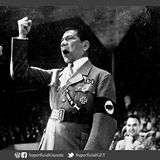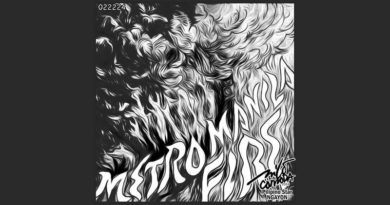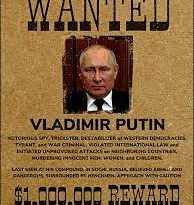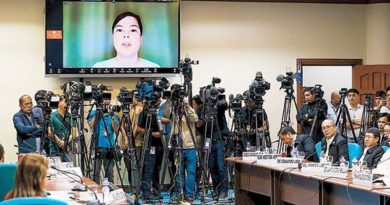Op-Ed: Column | OPINION ON PAGE ONE – Will DU30 bury all thoughts about revolutionary govt?
AN earlier report said Tokyo might be forced to withdraw its official development assistance (ODA) of one trillion yen ($9 billion) to the Philippines over the next five years, plus $2 billion in private sector loans at a ridiculously low interest rate of 0.001 percent per annum, should President Rodrigo Duterte declare a “revolutionary government.”
This failed to figure either in the talks between Japanese Prime Minister Shinzo Abe and DU30 during the latter’s Tokyo visit on October 30-31, or in the press commentaries during and after the visit.
This, however, was not because Tokyo had an apparent change of heart, but rather because Abe chose a more subtle, statesmanly approach. Instead of directly raising the issue with DU30, Abe, who had just won a fourth term as prime minister to become the longest serving post-war Japanese prime minister, chose to restate his concern without further need of words.
He clearly recognized DU30’s hastily arranged visit, so soon after his election, as a response to the concern that had been expressed through some of DU30’s officials, and decided to spare his guest, whom he described not only as a friend but above all as a virtual member of his “family,” any embarrassment. Despite the obvious inconvenience of receiving an official guest at a very busy time after an election—such visits normally take a few months to prepare—Abe hosted DU30 for dinner at the Prime Minister’s residence and arranged for his call, together with his common-law wife, Cielito “Honeylet” Avanceña, on Emperor Akihito and Empress Michiko.
Unprecedented visit
It was an extraordinary meeting. It is not known how many foreign dignitaries with the same marital status have been received by the imperial couple in official audience.
Abe assured DU30 of full support and assistance in rebuilding Marawi, where over 1,100 combatants and civilians had been killed, 300,000 residents displaced, and a lot of public buildings and private homes destroyed during its five-month siege by the IS-aligned Maute extremist group. He also pledged to help strengthen the country’s overall social infrastructure, and fight illegal drugs and terrorism. This includes specific projects like a subway system in Metro Manila, a container port in Cebu, energy projects in Mindanao, maritime safety projects along the country’s long coastline and patrol craft and maritime equipment for the Philippine Coast Guard.
The amount of promised aid and investments from Japan is still lower than the $24 billion promised by China during DU30’s state visit to Beijing in October 2016, but the terms and conditions appear to be more favorable than those of Beijing’s. The main criticism about Chinese aid is that Chinese-funded projects will be built by Chinese workers coming from China, creating no employment for Filipino workers. At the same time, the presence of so many Chinese workers in the country could present some national security and other problems. As far as the loans are concerned, the Japanese loans charge virtually no interest at all, with an extended grace period of 25 years.
Support for constitutional govt
Clearly, the Abe government has decided to pour out such aid to help ensure the success of DU30’s constitutional government, not to encourage DU30 to stage a coup against himself and proclaim a revolutionary government. Tokyo would like to be a factor in making sure the DU30 government becomes an important democratic pillar in building the stability, peace and progress of the region. If DU30 has failed to read this correctly, then he is inviting danger to the nation and to himself. He is inviting Abe and everybody else to withhold all assistance and loans that had been promised to ensure the success of his lawful government.
DU30 is much too smart not to know this, but it appears he has no shortage of minions who cannot seem to distinguish between a constitutional government and an unconstitutional one. Yesterday, while writing this column, I caught an advisory online about a rally at the Quezon Memorial Circle, supposedly by rabid DU30 supporters, calling on the President to establish a revolutionary government. I had no chance to check what kind of crowd turned up.
Three days earlier, while a crowd estimated at 15,000 marched from the EDSA Shrine to the People Power monument on EDSA near Camp Aguinaldo to call for an end to the extrajudicial killings, a text message circulated within and outside the military camps, announcing that on November 30, pro-DU30 supporters would mark the 154th birthday of Andres Bonifacio, who led the Katipunan’s 1896 revolution against Spain, by declaring a “revolutionary government,” first in Davao, then in other parts of Mindanao, then in the Visayas and ultimately in Luzon.
I have been receiving queries about it.
What game plan?
Is it possible, many would like to know, that DU30 is encouraging these calls to build up so that as soon as they peak, he could rise as a constitutional champion and reject such calls as absurd? Or is he looking forward to responding “favorably” to the cry of his own crowd? The mere call for a revolutionary government is not a constitutional offense in itself—-it is part of our freedom of speech; but to declare a revolutionary government is preeminently extra-constitutional, for the very first thing it destroys is the Constitution.
We have said this a few times before, and it may not be the last time we’ll have to say it here. Were an opposition group or the people themselves, for whatever reason, to force DU30 to step down, his constitutional successor cannot abolish the Constitution, which names him or her to that position. But were DU30 to be ousted through extra-constitutional means, his successor could not invoke the Constitution as the basis of his or her takeover; therefore, he or she will have to formally abolish the Constitution and declare a revolutionary government.
A rotten offense
But having been elected president in a national election, DU30 cannot renounce the constitutional government and establish a revolutionary government. Physically, he may be able to do so, if the people and the Armed Forces do not prevent him. But he would be committing the most rotten offense against the Constitution, which says the Philippines is a democratic and republican state, and sovereignty resides in the people and all government authority emanates from them.
DU30 would reduce himself from a legitimately elected president into a craven usurper whose power would no longer derive from the will of the people, but from his own naked ambition. He would become no better than a foreign invader who has imposed himself by force or the threat of the use of force upon the nation. He would provoke everybody else to challenge his claim to power, and it would become everybody’s patriotic duty to work for his ouster. Many will not hesitate to offer their lives, if needed, to bring him down. It could provoke a bloody civil war.
What could possibly motivate this preferred course of action?
So much power
The presidency has given DU30 a plenitude of powers. He runs the presidency and the entire government as though he were the sole operating authority. No one has questioned his legitimacy the way so many questioned Cory Aquino’s or Gloria Macapagal Arroyo’s legitimacy. Lacking neither the necessary support nor the opportunity, he has failed to utilize legitimate power wisely and effectively. He has equated government with a single issue—his war on drugs—and he has equated this war not with the elimination of illegal drugs, but rather with the physical elimination of all those suspected of dealing in drugs.
He has done very little to unite, and almost everything to polarize and divide. This has not allowed our people to come together under an unquestioned constitutional mandate; what chance is there now that our people, not to say our political and social system, could work better under the same fellow, as a revolutionary president?
Having seen the best opportunities wasted and the simplest ideas debased and corrupted these past 16 months, one can only pray that DU30’s days for playing at government are over and that he is now prepared to learn his first basic lessons on how to run a country of 100 million people in a time of crisis.
The luck of the draw has put DU30 in his present slot—host of the East Asia Summit on the 50th anniversary of the Association of Southeast Asian Nations in Angeles City on November 13-14. For at least three days, he will be dealing closely with all of the Asean heads and the dialogue partners that include US President Donald Trump, Chinese President Xi Jinping, Japan’s Abe, Russian Prime Minister Dmitry Medvedev, Australian Prime Minister Malcolm Turnbull, and South Korean President Moon Jae-in.
Given DU30’s known record, this cannot be immune from disaster. My simple prayer is that he would somehow rise to the occasion, bury all thoughts of revolutionary government, and try to become the statesman he needs to be for at least this brief occasion, even if he cannot do so for the next five years.
Courtesy: The Manila Times | BY FRANCISCO TATAD ON
NOTE : All photographs, news, editorials, opinions, information, data, others have been taken from the Internet ..aseanews.net | [email protected] |
For comments, Email to :
D’Equalizer | [email protected] | Contributor











